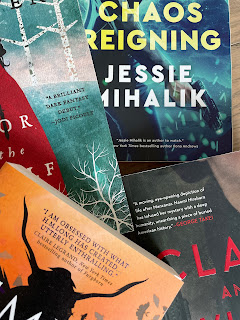What's so hard about back cover copy? I'm just summarizing the plot, right? Giving you a short snippet of insight into the story?
It's what I thought when I was first published. Except my editor kept making me rewrite it. And rewrite it. I'd like to tell you I learned better by book two. I hadn't. In fact, back cover copy didn't get any easier for years. Because I was coming at it all wrong.
I don’t recall who finally clued me in, but I had to learn that back cover copy has nothing to do with the story. It has everything to do with the conflict and with the story question. At one point, I'd have shrugged and said, 'those are the same thing.'
I've learned better. Some.
Try summarizing the breadth and depth of your story in three paragraphs. I bet you tear out your hair. Your story spans hundreds of pages and sprawls across tens of thousands of words. It's people and places and events and backstory and oo! I forgot to tell you the main character grew up apprenticed to a dragon! I mean, it may be an amazing story, but it won’t sell a book because it doesn't lodge a question or a compulsion in a reader's mind.
That question should be, “OMG, HOW?”
Your conflict is the bait on the story question hook. Conflict, obstacles, and stakes. It doesn't matter what genre you write. Tell me what your characters need, tell me why they need it, tell me what's in the way (and why the answer is on some level 'themselves') and make sure to tell me what happens if they don't overcome their obstacles. What do they have to learn or overcome in themselves to earn the right to cross the final threshold successfully - assuming you aren't writing tragedy?
Recall our main character who was apprenticed to a dragon. All she wants is to learn to fly, because she's in love with the dragon's son and dragons court on the wing, but she can't fly because she's human. Internally, that sets our heroine up to believe she's a failure. She's not good enough. Maybe this echoes an old wound about not being good enough because her family gave her away to the dragons. All we know is that she longs to fly so she can tell the love of her life how she feels.
The young dragon prince, on the other hand, wants to eradicate humans because they hunted and killed his father. He can't start burning down human cities, though. The humans would rally and endanger the dragon prince's remaining family. Internally, he wants to avenge his dad and protect his remaining family. While he’s been kind to the human working with his mother and maybe even admires her, he’s convinced that all other humans are mean and nasty and destructive.
We create a sentence or two about how these different conflicts collide and interfere with one another. Finally, we cap it with what the two of them must learn if they're going to get together. If they aren't getting together, they still must learn something before they can win whatever challenge awaits at the climax of the story.
And there’s the trick. Your job with back cover copy is to snag the reader’s imagination by presenting all the desires, all the stumbling blocks (look! She’s in love with a dragon who hates humans! Uh oh!) and set up the horrible, dreadful consequences of the characters failing to learn their lessons before the climax. Aaaand you have to do that without giving the climax away AND while making it seem like these two will never rise above their obstacles.
Maybe our heroine argues with the dragon prince because she’s dead set on convincing him not all humans are bad. He’s not buying it, so he challenges her to prove it by hunting down his father’s killers and bringing them to him. Since she’s secretly convinced she’s a failure and not good enough, she refuses. He throws her out and banishes her. Cool. We all know that to prove her love, she’s going to go hunt down the killers (and learn to believe in herself at the same time.) We all know he’s going to start harrying innocent humans and endangering the rest of his family (and come face to face with the terrible consequences of his actions and realize he’s become what he hates.)
Finally here’s what the stakes sentence might look like:
If they cannot learn to trust one another and work as a team, all dragon-kind will die.
(Yeah, yeah. It’s a romance. She catches the killers and bargains with the dragon prince for a ride on his neck while he flies so she can confess her feelings, okay?)




.jpg)




